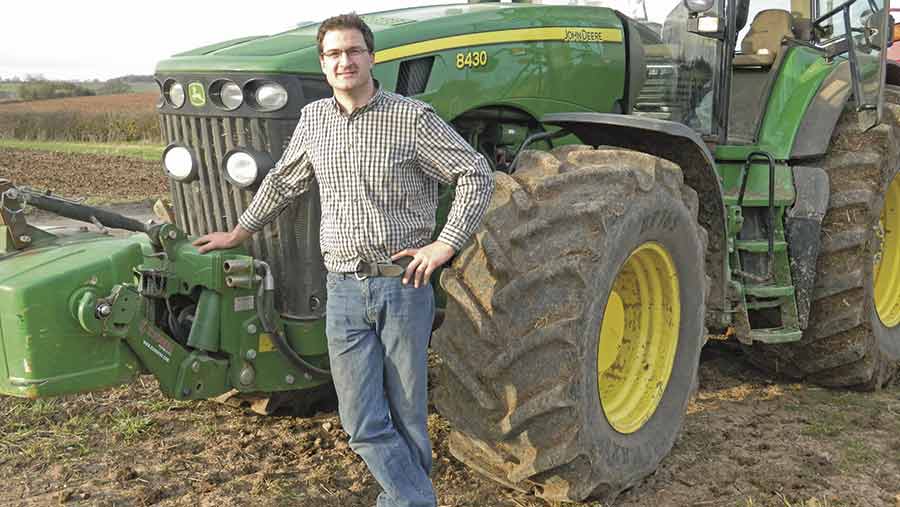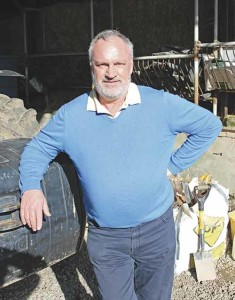Three growers slash labour and machinery costs with joint venture
The decision to form a joint venture has allowed three Warwickshire farming businesses to benefit from lower machinery costs, increased efficiency and better timeliness.
Previous experience as head operator for a joint venture farm business in Northamptonshire proved useful when farm manager Rob Fox took up the reins at Squab Hall near Leamington Spa in 2010.

Robert Fox ©AHDB
See also: Save 15% on arable inputs by joining a buying group
Due to the rapid expansion of the business’s diversification into specialised storage, and the subsequent demands on the owner’s time, the 400ha farm was overequipped with machinery and had plenty of spare capacity.
“Apart from the combine, everything was too big for an arable farm of this size,” recalls Mr Fox. “So there was scope for making better use of our machinery and labour, and bringing our costs down, by collaborating with others.”
Initial approach
Initial discussions with an interested local grower, David Brightman, who farmed six miles away, revealed some common ground. So the two men drew up a list of all the kit they had between them, as well as any other items that would be required for farming their larger, combined area.

David Brightman
“At the beginning, we held on to everything, apart from the combines, replacing the two with one larger machine,” he reveals.
“We also kept it simple by drawing up a spreadsheet of the running costs of the equipment for cross-charging, and then started working together in 2012.”
Having got through the terrible 2012 harvest without incident, they continued throughout 2013, before agreeing to take the next step in May 2014.
“At that stage, we took the plunge and held a big machinery sale,” says Mr Fox. “From there, we were able to run one 6m drill, a self-propelled sprayer and the larger combine across our combined acreage, bringing immediate efficiencies.”
Two became three
After three years of working together, interest from a third local farmer, Winston Warhurst, saw them able to increase the farmed area to 730ha by initially taking on his harvest on a contracting basis, so that he could get an idea of how everything worked.
“A year on, he is now in the position of being able to sell his excess machinery in a local sale,” continues Mr Fox. “He has seen the benefits that such an approach has to offer, in terms of savings and logistics.”
All three farms have very similar cropping and establishment regimes based on combinable crops, and have introduced a proportion of spring cropping in response to blackgrass pressure, he acknowledges.
“The key to making it work is efficiency,” he notes. “We make sure that everything is in place before we start any field operations and we only move machinery between the blocks of land in the early morning or late evening.”
Block cropping is carried out, as some of the land is eight to nine miles away, with whole blocks being harvested in one go.
A chaser bin on wide tyres being pulled by a small tractor means that the combine can keep moving, as all three men recognised that harvest could be the bottleneck.
A 300hp wheeled tractor is the prime mover. A Sumo cultivator, Horsch Sprinter drill and three options for seed-bed cultivations are also used for crop establishment, depending on conditions.
Business advice
Management Matters is a new Crops series aimed to help you manage your arable business more effectively.
In the coming months, we will be tackling a range of topics. Catch up with previous pieces on our website
February: How to recruit and retain good farm staff
March: How growers can slash costs by sharing kit and labour
Cost savings
At Squab Hall, machinery costs have reduced from over £200/ha to about £155/ha – with Mr Fox anticipating that this figure will fall by a further £20-30/ha once the third member is fully integrated.
“Our labour bill has also fallen,” he points out. “The time that myself and our full-time employee spends on the other farms is charged out accordingly.”
While the other farms won’t have seen the same reduction in machinery costs, they have both benefited from productivity and timeliness improvements – with more still to come. Drilling 242ha in three-and-a-half days last autumn was a notable achievement.
“Other benefits have been knowledge sharing and teamwork, both of which have made our day-to-day jobs more enjoyable. There’s also more peace of mind for everyone.”
Being able to afford larger, more sophisticated equipment is another advantage, he adds. “Because we’re spreading the costs over a larger area, we can justify the investment in guidance and precision farming for variable applications.”
Mr Fox acts as the operations manager for the joint venture and also chairs the three meetings that the participants hold each year, where they review progress and discuss any issues, including machinery replacement.
“I look after all the logistics and do any staff management. It is very important that the staff are managed by one person.”
Formal agreement
A written agreement with exit clauses exists, but each member has to commit for an initial three-year period. Crucially, all three farms still run as three separate businesses, with their own independent management and decision-making, he stresses.
“We haven’t ruled out more integration, as there could be further savings available,” comments Mr Fox. “We are all doing our own grain marketing, for example, and buying our own inputs.”
Looking ahead, he would like to increase the farmed area to 1,200ha by bringing in one more farm, with talks already taking place with another local farmer.
“It’s a no-brainer, in my opinion. This sort of arrangement allows you to benefit from economies of scale, without paying very high rents for extra land. And the current economic climate means that we are all going to have to farm more efficiently.”
It does, however, require the right sort of person, he acknowledges. “A similar mindset or attitude is needed. Although it doesn’t have to be a big step at the beginning, taking the decision to sell all of your surplus kit is quite a leap.”
The farm business at Squab Hall is the AHDB’s Leamington Spa Monitor Farm, with Rob Fox hosting regular meetings and leading discussions on business and agronomic issues. Joint venture farming has been a topic of previous meetings, with machinery efficiency and cost savings being high on the agenda.

